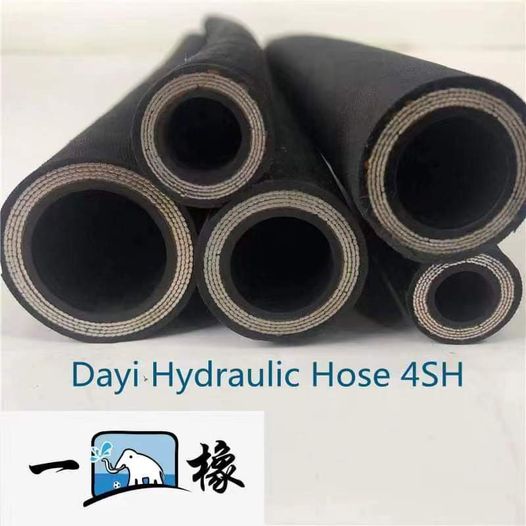335345435
Aug . 07, 2024 07:15 Back to list
Top Manufacturers of Smooth Cover Steel Wire Braided Hydraulic Hoses for Superior Performance
Understanding Smooth Cover Steel Wire Braided Hydraulic Hoses A Guide for Manufacturers
Hydraulic hoses play a pivotal role in transferring hydraulic fluid and ensuring the efficient operation of various machinery and equipment. Among the numerous types of hydraulic hoses available in the market, smooth cover steel wire braided hydraulic hoses are particularly favored for their strength, durability, and flexibility. This article aims to provide insights into the characteristics, applications, and benefits of these hoses, as well as highlight key considerations for manufacturers.
Characteristics of Smooth Cover Steel Wire Braided Hydraulic Hoses
Smooth cover steel wire braided hydraulic hoses are engineered to withstand high pressures and harsh conditions. The smooth outer layer not only gives these hoses a sleek appearance but also enhances their performance. The construction typically consists of multiple layers an inner tube made from synthetic rubber, reinforced with one or more layers of steel wire braiding, and a smooth outer cover, which is often made from oil-resistant rubber.
The braiding process is critical, as it provides tensile strength and prevents the hose from expanding under pressure. This makes them suitable for high-pressure applications, usually operating within a range of 1,500 to 5,000 PSI, depending on the specific design and material used. The smooth surface also facilitates easier cleaning and maintenance, reducing friction losses during fluid transfer.
Applications of Hydraulic Hoses
Smooth cover steel wire braided hydraulic hoses are versatile and can be found in various industries. They are commonly utilized in construction equipment, agricultural machinery, and industrial applications—essentially in any scenario where hydraulic power is necessary. Specific applications include
- Excavators and Loaders Essential for transferring hydraulic fluids to operate the machinery. - Agricultural Equipment Used in tractors and harvesters that require efficient hydraulic systems for operation. - Manufacturing Machines In assembly lines where precise hydraulic operations are needed. - Automotive Industry Used in hydraulic brake systems and power steering in vehicles.
Benefits of Smooth Cover Hoses
One of the primary advantages of smooth cover steel wire braided hydraulic hoses is their resistance to abrasion, which extends their lifespan, especially in industrial settings where wear and tear are prevalent
. Additionally, the smooth surface prevents the accumulation of dirt and contaminants, promoting better hygiene and performance.smooth cover steel wire braided hydraulic hose manufacturers

Moreover, the flexibility of these hoses allows for easy installation and routing in constrained spaces, making them ideal for complex hydraulic systems. Their capability to handle a wide temperature range further enhances their adaptability across different applications.
Considerations for Manufacturers
For manufacturers looking to produce high-quality smooth cover steel wire braided hydraulic hoses, several factors should be taken into account
1. Material Selection Choosing the right synthetic rubber and steel wire can significantly impact the hose's performance and durability.
2. Quality Control Implementing stringent quality control measures throughout the manufacturing process ensures that the hoses meet industry standards and safety regulations.
3. Customization Understanding the specific needs of clients and offering tailored solutions can set a manufacturer apart in a competitive market.
4. Environmental Considerations As sustainability becomes increasingly important, using eco-friendly materials and practices can enhance a manufacturer’s reputation and compliance with regulations.
5. Market Research Staying current with industry trends and technological advancements can help manufacturers innovate and meet evolving customer demands.
Conclusion
Smooth cover steel wire braided hydraulic hoses are essential components in numerous industrial applications, and manufacturers play a crucial role in ensuring their quality and reliability. By focusing on the right materials, manufacturing processes, and customer needs, manufacturers can produce hoses that not only meet but exceed industry expectations, thereby contributing to the safe and efficient operation of hydraulic systems across various sectors.
-
SAE 100 R17 Black Smooth Cover Hydraulic Hose
NewsMar.07,2025
-
SAE 100 R17 Black Smooth Cover Hydraulic Hose
NewsMar.07,2025
-
SAE 100 R17 Black Smooth Cover Hydraulic Hose
NewsMar.07,2025
-
SAE 100 R17 Black Smooth Cover Hydraulic Hose
NewsMar.07,2025
-
SAE 100 R17 Black Smooth Cover Hydraulic Hose
NewsMar.07,2025
-
steel wire braided hydraulic hose
NewsMar.07,2025



